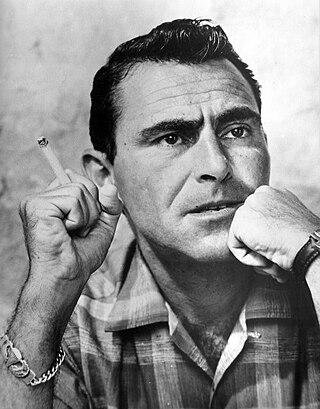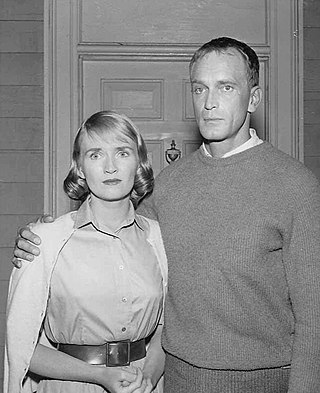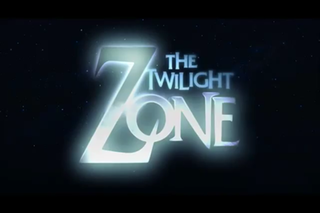Related Research Articles

The Twilight Zone is an American media franchise based on the anthology television series created by Rod Serling in which characters find themselves dealing with often disturbing or unusual events, an experience described as entering "the Twilight Zone". The episodes are in various genres, including fantasy, science fiction, absurdism, dystopian fiction, suspense, horror, supernatural drama, black comedy, and psychological thriller, frequently concluding with a macabre or unexpected twist, and usually with a moral. A popular and critical success, it introduced many Americans to common science fiction and fantasy tropes. The first series, shot entirely in black-and-white, ran on CBS for five seasons from 1959 to 1964.

Rodman Edward Serling was an American screenwriter and television producer best known for his live television dramas of the 1950s and his anthology television series The Twilight Zone. Serling was active in politics, both on and off the screen, and helped form television industry standards. He was known as the "angry young man" of Hollywood, clashing with television executives and sponsors over a wide range of issues, including censorship, racism, and war.

"Where Is Everybody?" is the first episode of the American anthology television series The Twilight Zone and was originally broadcast on 2 October 1959, on CBS. It is one of the most realistic Twilight Zone episodes, as it features no supernatural elements and is based on fairly straightforward extrapolation of science.
"Walking Distance" is episode five of the American television series The Twilight Zone. It originally aired on October 30, 1959. The episode was listed as the ninth best episode in the history of The Twilight Zone by Time magazine.
"Escape Clause" is episode six of the American television anthology series The Twilight Zone. It is "the story of a strange contract between a mortal man and his most satanic majesty"; it originally aired on November 6, 1959, on CBS.
"Judgment Night" is the tenth episode of the American television anthology series The Twilight Zone. In this episode, a passenger aboard a British cargo liner has no memory of how he came aboard, and is tormented by unexpected clues to his true identity and a sense that the ship is headed toward impending doom.
"What You Need" is the twelfth episode of the American television anthology series The Twilight Zone, airing on Christmas Day, 1959. It is based on the short story of the same name by Lewis Padgett, which was published in the October 1945 issue of Astounding Science Fiction magazine.
"I Shot an Arrow into the Air" is the fifteenth episode of the American television anthology series The Twilight Zone.

"Mirror Image" is the twenty-first episode of the American television anthology series The Twilight Zone. It originally aired on February 26, 1960, on CBS.

"The Monsters Are Due on Maple Street" is the 22nd episode in the first season of the American television anthology series The Twilight Zone. The episode was written by Rod Serling, the creator-narrator of the series. It originally aired on March 4, 1960, on CBS. In 2009, TIME named it one of the ten best Twilight Zone episodes.
"Eye of the Beholder" is episode 42 of the American television anthology series The Twilight Zone. It originally aired on November 11, 1960, on CBS.
"The Invaders" is episode 15 of season 2 of the American television anthology series The Twilight Zone. The episode, which originally aired January 27, 1961, starred Agnes Moorehead. It was written by Richard Matheson, directed by Douglas Heyes, and scored by Jerry Goldsmith. Distinctive features of this episode include a near-solo performance by one character, and an almost complete lack of dialogue. The only dialogue in the entire episode aside from Rod Serling's usual narration came from Douglas Hayes, the episode's director. In addition, this is the only episode in which Rod Serling gives his opening monologue at the start of the prologue, rather than the end. The protagonist portrayed by Agnes Moorehead often cries out in pain and terror, but never speaks.
"Will the Real Martian Please Stand Up?" is episode 64 of the American television anthology series The Twilight Zone. It originally aired on May 26, 1961 on CBS.
"It's a Good Life" is the eighth episode of the third season of the American television series The Twilight Zone, and the 73rd overall. It was written by series creator/showrunner Rod Serling, based on the 1953 short story "It's a Good Life" by Jerome Bixby. The episode was directed by James Sheldon, and is considered by some, such as Time and TV Guide, to be one of the best episodes of the series. It originally aired on November 3, 1961. The episode was one of four from the original 1959 series which formed the basis of the 1983 film Twilight Zone: The Movie.

"The Bard" is an episode of the American television anthology series The Twilight Zone. It was the final episode of The Twilight Zone to be one hour long. A direct satire of the American television industry, the episode features a parody of Marlon Brando by Burt Reynolds, and concerns an inept screenwriter, who through the use of black magic, employs William Shakespeare as his ghostwriter.
"Probe 7, Over and Out" is an episode of the American television anthology series The Twilight Zone. Its plot is a shaggy God story.
Twilight Zone literature is an umbrella term for the many books and comic books which concern or adapt The Twilight Zone television series.

The Twilight Zone is an American fantasy science fiction horror anthology television series created and presented by Rod Serling, which ran for five seasons on CBS from October 2, 1959, to June 19, 1964. Each episode presents a standalone story in which characters find themselves dealing with often disturbing or unusual events, an experience described as entering "the Twilight Zone", often with a surprise ending and a moral. Although often considered predominantly science-fiction, the show's paranormal and Kafkaesque events leaned the show much closer to fantasy and horror. The phrase "twilight zone", inspired by the series, is used to describe surreal experiences.

The Twilight Zone is a science fiction horror anthology television series, presented by Forest Whitaker. It is the second of three revivals of Rod Serling's original 1959–64 television series. It aired for one season on the UPN network, with actor Forest Whitaker assuming Serling's role as narrator and on-screen host. It was a co-production between Spirit Dance Entertainment, Trilogy Entertainment Group, Joshmax Productions Services, and New Line Television. It premiered on September 18, 2002, and aired its final episode on May 21, 2003.
References
- DeVoe, Bill. (2008). Trivia from The Twilight Zone. Albany, GA: Bear Manor Media. ISBN 978-1-59393-136-0
- Grams, Martin. (2008). The Twilight Zone: Unlocking the Door to a Television Classic. Churchville, MD: OTR Publishing. ISBN 978-0-9703310-9-0